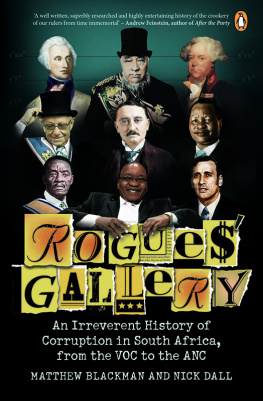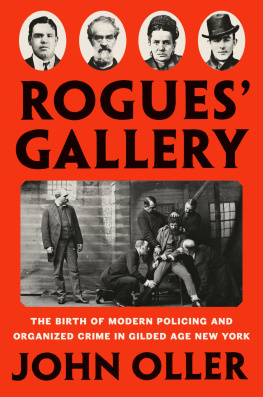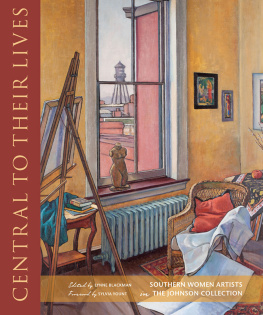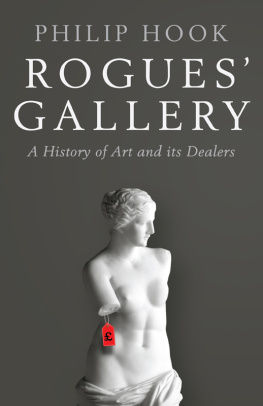Matthew Blackman - Rogues Gallery
Here you can read online Matthew Blackman - Rogues Gallery full text of the book (entire story) in english for free. Download pdf and epub, get meaning, cover and reviews about this ebook. publisher: Penguin Random House South Africa, genre: Detective and thriller. Description of the work, (preface) as well as reviews are available. Best literature library LitArk.com created for fans of good reading and offers a wide selection of genres:
Romance novel
Science fiction
Adventure
Detective
Science
History
Home and family
Prose
Art
Politics
Computer
Non-fiction
Religion
Business
Children
Humor
Choose a favorite category and find really read worthwhile books. Enjoy immersion in the world of imagination, feel the emotions of the characters or learn something new for yourself, make an fascinating discovery.
- Book:Rogues Gallery
- Author:
- Publisher:Penguin Random House South Africa
- Genre:
- Rating:5 / 5
- Favourites:Add to favourites
- Your mark:
- 100
- 1
- 2
- 3
- 4
- 5
Rogues Gallery: summary, description and annotation
We offer to read an annotation, description, summary or preface (depends on what the author of the book "Rogues Gallery" wrote himself). If you haven't found the necessary information about the book — write in the comments, we will try to find it.
Rogues Gallery — read online for free the complete book (whole text) full work
Below is the text of the book, divided by pages. System saving the place of the last page read, allows you to conveniently read the book "Rogues Gallery" online for free, without having to search again every time where you left off. Put a bookmark, and you can go to the page where you finished reading at any time.
Font size:
Interval:
Bookmark:

About the authors
Matthew Blackman has written as a journalist on corruption in South Africa, as well as on art, literature and history. He recently completed a PhD in Creative and Critical Writing at the University of East Anglia. He lives in Cape Town with a dog of nameless breed.
Nick Dall has an MA in Creative Writing from the University of Cape Town. As a journalist covering everything from cricket to chameleons, his favourite stories are always those about people dead or alive, virtuous or villainous. He lives in Cape Town with his wife and three daughters.
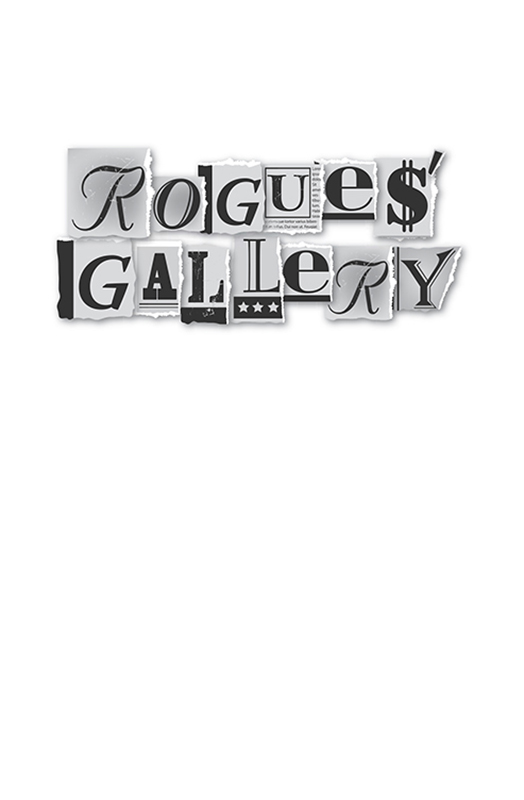

Published by Penguin Books
an imprint of Penguin Random House South Africa (Pty) Ltd
Reg. No. 1953/000441/07
The Estuaries No. 4, Oxbow Crescent, Century Avenue, Century City, 7441
PO Box 1144, Cape Town, 8000, South Africa
www.penguinrandomhouse.co.za

First published 2021
1 3 5 7 9 10 8 6 4 2
Publication Penguin Random House 2021
Text Matthew Blackman and Nick Dall 2021
Cover images
Lord Charles Somerset: Cape Town Archives Repository; Paul Kruger: Library of Parliament, South Africa; Sir George Yonge: Cape Town Archives Repository; Nico Diederichs: supplied; Cecil John Rhodes: public domain; Kaiser Matanzima: source unknown; Lucas Mangope: source unknown; Jacob Zuma: World Economic Forum/Eric Miller, CC BY-SA 2.0 via Wikimedia Commons; Eschel Rhoodie: National Archives, Pretoria; Magazine letters: vsilvek/shutterstock.com
All rights reserved. No part of this publication may be reproduced, stored in a retrieval system or transmitted, in any form or by any means, electronic, mechanical, photocopying, recording or otherwise, without the prior written permission of the copyright owners.
PUBLISHER: Marlene Fryer
MANAGING EDITOR: Robert Plummer
EDITOR: Alice Inggs
PROOFREADER: Lisa Compton
COVER DESIGNER: Ryan Africa
TYPESETTER: Monique van den Berg
INDEXER: Sanet le Roux
ISBN 978 1 77609 590 2 (print)
ISBN 978 1 77609 591 9 (ePub)
To Shelly
And in memory of Michael Blackman
INTRODUCTION
The problem began when Jan van Riebeeck came here. Jacob Zuma
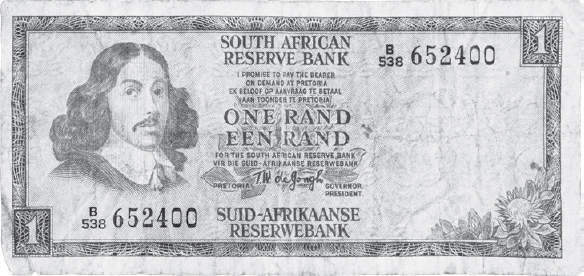
Jan van Riebeeck was considered too ugly to be the face of old South African banknotes. A seventeenth-century Johnny Depp, by the name of Bartholomeus Vermuyden, was chosen as his replacement
It is tempting to say that good old Jan brought with him to South Africa what some have termed the pandemic of corruption and others refer to as our national sport. The word corruption does, after all, have its roots in Europe, coming from the Latin verb rumpere, which implies the breaking of something altogether or completely. In this there is the suggestion that it takes more than just one rogue to break something altogether. And in South Africa, as you will discover in the pages that follow, corruption has in many ways been a multiracial, multicultural and multilingual endeavour.
The story of Van Riebeecks corruption is, however, one of failure. Because, unlike the other men in this book (and they are all men), he resigned just before he could fill his pockets in Vietnam, and pickings at the Cape were too slim for him to make any real cash.
An up-and-coming employee of the Dutch East India Company (VOC), Van Riebeeck (who understood the Vietnamese language well and behaved civilly to the Vietnamese) was denied the top job in Nam after being accused of an illegal side hustle in 1648, and he hightailed it (in the seventeenth-century sense of the word) back to the Netherlands before he could be fired.
As fate would have it, the ship that took him home stopped in Table Bay to pick up some men whod spent almost a year living near what is today the Dolphin Beach Hotel after their vessel, the Nieuw Haarlem, had run aground the previous winter. Their descriptions of the Capes fertile land, abundant fish and livestock, and relatively easy access to fresh water and firewood piqued Van Riebeecks interest, so much so that he added his voice to their calls for the Company to establish a maritime replenishment service there.
The Haarlem survivors submitted a remonstration that went to great pains to convince the notoriously tight-fisted Company directors of how cheap it would be to establish a settlement. Their document also dismissed the popular conception
They would not get their wish. In an attempt to climb back on the Company ladder, Van Riebeeck successfully petitioned to be the Capes first commander. He was, according to Eric Walker, a thick-set, determined little man of thirty-three,
As weve mentioned, the lack of written records means its impossible to say with any certainty how virtuous or corrupt South Africans were before 1652. That said, one does get the impression from Van Riebeecks journal (admittedly not an objective source) that knavery comes naturally to all members of the human race. It should come as no surprise that he had it in for the local population:
Hottentoos [Van Riebeeck used the term to refer to indigenous people of the Cape Peninsula] without cattle arrive at the fort, boldly stealing whatever they can lay their hands upon, not hesitating to deprive our people even under the fort, when unarmed, of their property, and coaxing the children aside to rob them of their brass buttons, though they are so well treated.
His contempt for a man known to the Dutch as Herry and by his own people as Autshumao, who acted as a go-between and interpreter, is a little more surprising:
All our cattle, 44 in number, stolen Sunday by the Watermen [known today as the Goringhaikona] during Divine service. The thieves have always been
The same goes for his own Company employees:
June 29th. Reported, that a soldier, Evert Barentz, of Groningen, had last night, during prayers, stolen some barley from the stores denied it at first, but promised his liberty, he confessed that Hendrick Juriaensz, of Swartsluys, had urged him to do it. Various others had eaten of the barley, but all declared that they did not know whence it came, only that said Juriaensz had stated that he had obtained it from the Tulp. Being called he confessed everything and shewed the place where more had been hidden; consequently apprehended with Eldert Jansz, of Oost Friesland, who had mounted guard to do the deed.
While Barentz managed to avoid punishment by ratting on his mates (plenty of that in the pages to follow), Juriaensz was keelhauled (and thrashed for good measure) and Jansz was made to fall three times from the yardarm, a punishment which involved being dropped from a ships mast with your arms tied behind your back, generally resulting in two dislocated shoulders.
However comic the crimes and gruesome the punishments, this pilfering of cattle, brass buttons and barley is hardly worth writing home about when one considers the great feats of corruption that are to follow. The truth is, the Cape of the 1650s was not a sufficiently developed bureaucratic state for bona fide corruption as we know it to thrive. (Which is probably why Van Riebeeck spent much of his ten-year stay dreaming of a promotion to India.)
Font size:
Interval:
Bookmark:
Similar books «Rogues Gallery»
Look at similar books to Rogues Gallery. We have selected literature similar in name and meaning in the hope of providing readers with more options to find new, interesting, not yet read works.
Discussion, reviews of the book Rogues Gallery and just readers' own opinions. Leave your comments, write what you think about the work, its meaning or the main characters. Specify what exactly you liked and what you didn't like, and why you think so.

